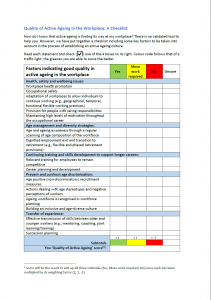The proportion of older workers in the European Union will increase in coming decades. As a consequence, the average age of European workers will soon be higher than ever before. What should we do about this? We need to define strategies by which to prolong the work life of employees, encouraging them to deepen their commitment to the company and have a positive attitude toward staying on the job. All of this can be done by improving their health, quality of life and on-the-job satisfaction.

This means that the workplace must become a major platform for promoting Active Ageing (AA). What advantages does the promotion of Active Ageing have for workers?
Measures that promote AA improve and strengthen older workers in several ways. First of all, the physical and cognitive conditions of the job are adapted to the needs of each employee, depending on his or her capacities. This brings older workers a greater sense of well-being, more positive attitudes at work and a higher degree of employability.
In addition, making AA a priority brings positive consequences to all workers, in terms of relationships between generations. Work is a medium of social exchange between people of different ages but it is also a space in which to bring together the skills of the younger workers and those of the older generations. This naturally heightens intergenerational learning, which can take the form of orientation, training and consulting among individuals.
Companies that support AA offer workers greater opportunities for learning and development as they grow older, especially as workers reach old age. Learning is ageless: what changes is the way that learning occurs. In settings that promote AA, older workers have easier access to training —for personal and professional development— and they also have equal opportunities to acquire new skills and update their professional competencies.
In conclusion, effective AA measures, in addition to prolonging the work life of employees and thus delaying retirement, also bring improvements in the health and capacity of older workers. They promote work environments that do not discriminate against older workers and they support life-long learning, adapting the learning processes to the needs of these workers.
We know that work settings that are positive and favorable to ageing persons can help avoid illness and physical/mental deterioration, enhance cognitive and physical capacities and generate positive and active attitudes toward life. The quality of our work life has a great impact on all of us, since most of us spend a lot of our time working. Recent longitudinal studies indicate that a person’s work capacity prior to retirement is a good predictor of how independent that person will be in his or her daily life between the ages of 73 and 85. So, the greater the work capacity before retirement, the better quality of life a few years down the road. Clearly, making solid investments in the area of active ageing at work is of great importance. Investing in safety and health at work is an investment in the rest of our lives.








